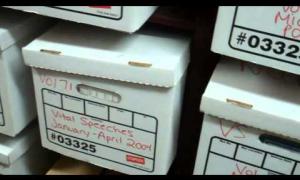Anonymity Aside: How to Become a Well-Known Speechwriter
November 10, 2009
Speechwriting is the best-paying job in corporate communication. But since CEO clients these days turn over faster than boats without bottoms, speechwriting has also become one of the most risky jobs around.
And since speechwriters typically keep a low profile, most people in their own organizations don’t know what they do; they understandably worry that if they go overboard no one will ever find them.
Smart speechwriters protect themselves by polishing their résumés as often as their shoes, entering their work in awards programs, networking at conferences and online, and keeping in regular contact with recruiters.
A handful of executive communication pros further hedge their professional bets by making themselves well known in their small professional world. How do they pull this off? In my experience, they begin the process simply by pitching a column idea to the editor of a communication trade publication like this one, or pitching a seminar idea to a conference organizer.
Pitch an idea, get visibility: Surely, getting published or getting a stage isn’t as automatic as that! Actually, it is, as long as you offer one of the following:
One interesting idea. Maybe you believe the impact of a speech can, contradictory to general opinion, be quantified. Maybe you think most executives are giving the wrong kinds of speeches to the wrong audiences, and you don’t mind setting speechwriters straight. Or maybe you have the ultimate man-bites-dog notion, that executive presentations should actually rely more on PowerPoint.
Such ideas will get people’s attention, and if you can support them in a column or at a conference, they’ll likely see the light of day.
A novel technique. You’ve found a way to write a 20-minute speech in an hour. You’ve created a foolproof method for structuring a speech. You know how to organize an executive communication department so that only what matters gets done. If your idea roughly fits into a 750-word column or an hour-long conference session, you’re in business.
An instructive tale. You decided to hire a staffer whose sole job it was to publicize and otherwise “repurpose” every executive speech. You outsourced your whole speechwriting operation. You tried to apply Six Sigma principles to the executive communication process. What were the results? It doesn’t matter if you succeeded, only that you learned something along the way that can benefit others.
A willingness to be candid. You don’t know any more than anyone else with your level of expe-rience about getting access to senior management, sneaking your speeches through the approval chain, getting your speaker on the dais at the Detroit Economic Club, but you’re more willing than most to actually share your methods, madness and all. To paraphrase Edgar Allan Poe, everybody’s got a conference session in them, if they’ll only tell the truth.
You may have to approach a number of editors or conference directors of a few publishers and associa-tions (the former are more accessible than the latter). You might have to wait six months or a year for a plat-form to open up. And your idea might go through a bit of massaging, I think it sounds more like an audio con-ference than an article, or maybe it’s more a panel discussion than a straight lecture.
But communication trade publishers aren’t overwhelmed with great ideas from practitioners. So if you have something substantive to share with your professional peers, you’ll most likely get your chance to raise your visibility within the invisible profession. (And a bonus secret: Once you write a great piece or give a great conference session, you’re on the path from obscure communicator to practitioner-guru; associations or pub-lishers will turn to you again and again.)
And if you don’t have ideas, techniques, tales to tell or the courage to be candid? Well, maybe you’re better off keeping a low profile until you do!


